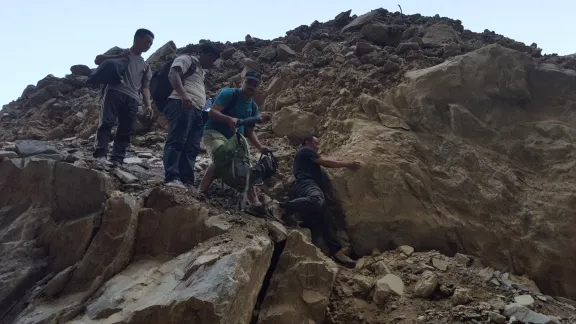
The LWF crosses a river on their way to the project site. Photo: Swosthani Gurung
“Team effort is essential”
(LWI) - Nepal’s remote mountain trails may be attractive to tourists, but to the The Lutheran World Federation (LWF) team, the country is also a challenge: Many communities we serve are difficult to access. Swosthani Gurung, LWF Project Manager recalls some of her experiences.
It has been over a year since Swosthani Gurung started working in Gorkha, the epicentre of the devastating 2015 Nepal earthquake. The LWF team, which consists entirely of local Nepali, is working in communities who have been hit by the earthquake, to restore food security and rebuild critical community infrastructure.

Swosthani Gurung with the locals at Gumda. Photo: Dr Subash Gurung
The team also supports the communities in restoring livelihoods, and enhancing their resilience to future earthquakes. Despite the difficult access, Gurung is proud to say that they have so far been able to complete their work on time.
When Gurung visits a project site, it takes her a minimum of three days - on foot. The furthest she remembers walking were nine days. “It is most difficult during the monsoon season,” she says. Gorkha is high up in the Himalaya. The province has a high risk of landslides and little road access, which makes it difficult to travel by vehicle.

Returning to Gorkha headquarters from project site. Photo: Chandra Bahadur Singh
"We travel very carefully,” Gurung says. The travel route is shared with the team and partners before the trip, to learn about possible dangers, and to explore alternatives. “When we are travelling in areas hit by landslides, one of us looks at the top of the mountain to see if there is anything falling while the others cross it. Team effort is essential while working in such areas,” she says.
We forget all the difficulties when we see how our work brought positive change in a person’s life. Their smiling faces, blessings and gratitude is always a source of inspiration and motivation for us to work much harder.
Working in the communities creates emotional ties with the people, Gurung says: “We forget all the difficulties when we see how our work brought positive change in a person’s life. Their smiling faces, blessings and gratitude is always a source of inspiration and motivation for us to work much harder.”

Community Sensitization at Gumda. Photo: Swosthani Gurung
It is also vital to have a good standing with the local communities. In February, one of the project staff lost consciousness in the jungle. The villagers found him and took him to the nearby medical facility, which informed the colleagues and from where an airlift to Kathmandu could be organized.
"We do acknowledge and respect the work done by our staff during humanitarian crises,” Dr Prabin Manandhar, Country Director of LWF Nepal says. “During emergencies, they often go beyond their usual duties to provide humanitarian assistance."

Construction of wooden bridge at Laprak. Photo: LWF/ Bibek Shrestha
Contribution by Kritagya Regmi, LWF Nepal
LWF focuses on disaster risk reduction and emergency preparedness and response. In its humanitarian and development interventions, LWF Nepal focuses most on the communities like Dalits, indigenous peoples, people with disability, food insecure and women-headed households. Most of the time LWF staffs work in dangerous situations in the crises areas. They are committed towards improving the life of less fortunate people.
The project “Restoring Food & Nutrition Security and Building Resilient Livelihoods in Earthquake Affected Areas" in the earthquake-hit communities in Gorkha are supported by World Food Programme (WFP) in partnership with LWF Nepal and Primate's World Relief and Development Fund, Canada (PWRDF). 5,500 households have benefitted so far, LWF is now working to support 1,708 households in the villages of Laprak, Gumda, Kashigaun, Uiya, and Sirdibas of Gorkha district.


